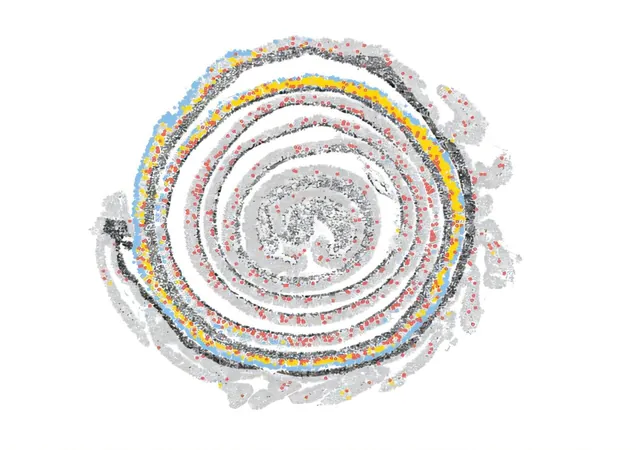
Transformative Weight-Loss Drug Tirzepatide Shown to Cut Heart Failure Death Rates!
2024-11-20
Author: Siti
Introduction
In groundbreaking news, recent research has unveiled that tirzepatide—a drug initially developed for weight loss and diabetes management—significantly reduces the risk of death and complications from diastolic heart failure. This revelation comes from extensive studies conducted by UVA Health, highlighting the medication's potential to reshape therapeutic strategies for patients grappling with obesity-related heart conditions.
About Tirzepatide
Tirzepatide, produced by Eli Lilly and Co., was evaluated in the SUMMIT clinical trial, which included 731 patients from 146 medical centers across the United States and internationally. Participants suffering from diastolic heart failure and obesity—defined by a body mass index (BMI) of 30 or higher—were randomly assigned to receive either tirzepatide injections or a placebo. The results were monitored over a median duration of two years.
Study Findings
Findings indicated a stark difference in health outcomes: 56 patients in the placebo group either died or experienced worsening heart failure, while only 36 patients receiving tirzepatide faced similar fates. In addition, those treated with tirzepatide experienced an impressive average weight loss of 11.6%.
Expert Opinions
Dr. Christopher Kramer, chief of the Division of Cardiovascular Medicine at UVA Health, emphasized the significance of this class of medications, stating, 'This drug will become an important part of the armamentarium for patients with obesity-related heart failure and preserved heart function.' This highlights a critical shift in how we might approach treatment for heart failure—focusing not solely on managing the condition but also addressing underlying obesity.
Understanding Diastolic Heart Failure
Diastolic heart failure, or heart failure with preserved ejection fraction, is a serious condition where the left ventricle of the heart becomes stiff, impairing its ability to pump blood. Alarmingly, this variant accounts for nearly half of all heart failure cases, a fact that underscores the urgency for effective treatments. With heart disease responsible for one in five deaths in the U.S. every 33 seconds, the implications of this research could be profound.
Obesity and Heart Failure Risk
Given that obesity is a principal risk factor for developing heart failure, researchers were keen to explore tirzepatide’s efficacy. Results from the trial showed not only a decrease in death rates but also a significant reduction in hospitalizations among tirzepatide recipients. Improvements were noted in patients' mobility, as evidenced by enhanced six-minute walk test results, alongside substantial decreases in inflammatory biomarkers predictive of severe cardiovascular incidents.
Tirzepatide's Positive Impact on Heart Health
Dr. Kramer also led a magnetic resonance imaging study within the trial, assessing how tirzepatide impacts heart structure and function. The findings revealed decreases in the left ventricular mass (the heart's weight) and surrounding fat, with reductions in heart mass closely tied to body weight loss. 'This drug is reversing the abnormal properties of the heart brought on by obesity. There is much more to these drugs than weight loss alone,' asserted Dr. Kramer, emphasizing the broader cardiac health benefits offered by tirzepatide.
Side Effects
Though some participants experienced mild to moderate gastrointestinal side effects—including nausea and diarrhea—these were manageable and did not overshadow the drug’s substantial benefits.
Conclusion
The results from these crucial studies will be published in multiple prestigious medical journals, coinciding with the American Heart Association's meeting in Chicago, marking a significant milestone in cardiovascular health research and treatment. In summary, tirzepatide emerges as a beacon of hope not just for weight management but also as a pivotal player in combatting heart failure caused by obesity. This innovative approach could potentially save countless lives, offering a holistic solution in the fight against heart disease.




 Brasil (PT)
Brasil (PT)
 Canada (EN)
Canada (EN)
 Chile (ES)
Chile (ES)
 España (ES)
España (ES)
 France (FR)
France (FR)
 Hong Kong (EN)
Hong Kong (EN)
 Italia (IT)
Italia (IT)
 日本 (JA)
日本 (JA)
 Magyarország (HU)
Magyarország (HU)
 Norge (NO)
Norge (NO)
 Polska (PL)
Polska (PL)
 Schweiz (DE)
Schweiz (DE)
 Singapore (EN)
Singapore (EN)
 Sverige (SV)
Sverige (SV)
 Suomi (FI)
Suomi (FI)
 Türkiye (TR)
Türkiye (TR)